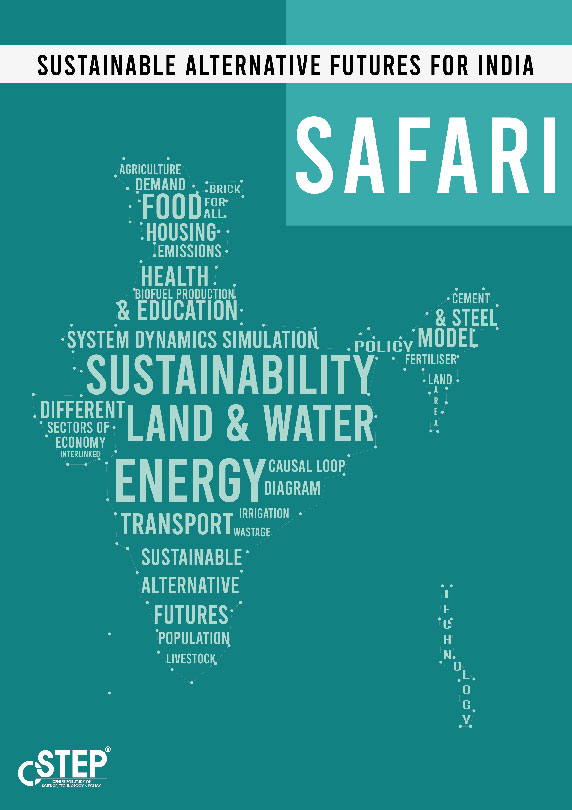Climate change mitigation involves strategies aimed at decreasing greenhouse gas emissions, promoting renewable energy sources, improving energy efficiency, and implementing sustainable practices. CSTEP focuses on building models to simulate India's future across sectors, such as transport, industries, buildings, agriculture, and forestry, to find interventions required to achieve a sustainable and secure future. Our work also involves the study of certain themes that cut across sectors (quality of life and development vs climate action, water and land demands for agriculture vs power, etc).
CSTEP's SAFARI model: Balancing development with climate action requires a good understanding of the interactions between sectors, natural resource systems, and environmental externalities. The Climate Change Mitigation at CSTEP has undertaken a modelling study with the aim to provide such an understanding and help create scenarios for low-carbon development through the use of an interactive simulation tool called Sustainable Alternative Futures for India (SAFARI). You can access the tool here.
SAFARI estimates the energy, emissions, and resources implications of achieving developmental goals such as food, housing, healthcare, education, power for all, and transport up to 2050. The user interface allows you to explore these implications as well as the trade-offs between them. Using SAFARI, you can create integrated scenarios across sectors and test out the impact of policy choices on energy, emissions, and resources. Ultimately, we hope that this tool can be used to provide insights into developing and tracking India's long-term strategy (LTS) in line with the Paris Agreement. For more information, please contact safari@cstep.in



Simulating India's Safar to 2050
We believe that in long-term forecasting, understanding the dynamic behaviour of the system and its responses to various interventions is crucial.
COP 25 - Call for Global Action Now
COP25 comes close on the heels of the UN Climate Summit in New York, in September. Several countries (68 countries accounting for 8% of global GHG emissions) signalled that they will be strengthening commitments at Madrid.
Loss and Damage, and why this was a lost cause at COP25
The 25th Conference of the Parties (COP25) in Madrid was a disappointment on many accounts. Hailed as the ‘ambition COP’, it proved to be everything but. One of the core issues that negotiators were attempting to resolve, but were unsuccessful at, was Loss and Damage financing.
Decarbonising the Cooking Sector
The optimal approach to decarbonise cooking is to start using a clean and low-carbon fuel. It is essential to ensure that the shift to modern, clean cooking fuels and the use of energy-efficient technologies go hand-in-hand. Transition to electricity-based cookstoves will offer similar or higher decarbonisation outcomes and lower the risks on energy security.
Energy and Emissions Implications for a Desired Quality of Life in India Part 2: Demand Estimation
This project aims to understand the synergies and trade-offs involved in facing the unenviable challenge of balancing their developmental goals and climate targets.
Long-term energy system planning considering short-term operational constraints
-
Long-term planning models give an insight into possible energy scenarios and do not examine technologies in detail.
-
Renewable energy sources have spatial and temporal intermittency that causes challenges for short-term system operations.
-
Including operational details of generators directly in a planning model reduces intricacy of handling separate models.
-
Operational constraints increase usage of conventional generators and reduce overall capacity needs in planning model.
Electric Buses in India: Technology, Policy and Benefits
The Bangalore Metropolitan Transport Corporation (BMTC) is a government organisation that operates the public transport bus service in Bruhat Bangalore Mahanagara Palike (BBMP) area and parts of the Bangalore Metropolitan Region (BMR). At present, BMTC is one of the better run bus transport systems in the country.Over the past decade, India’s cities have been witnessing an increasing trend in motorization with deteriorating air quality, and there have been calls to promote public transport as a way out of this gridlock.
Need for Government Support for Public Bus Transport
With increasing trends in road congestion, air pollution, energy demand and emissions, there is a need to look for effective solutions to meet the urban transport demand in Bangalore Investment in public transport is imperative Buses are the cheapest, relatively energy and emission efficient form of public transport systems which can be proposed to provide service to the core and peripheral areas in a shorter time span Bangalore Metropolitan Transport Corporation (BMTC) with good network coverage in Bangalore Urban district and as well as some areas in Bangalore Rural district needs to be s
Electric Buses in India: Technology, Policy and Benefits
The Bangalore Metropolitan Transport Corporation (BMTC) is a government organisation that operates the public transport bus service in Bruhat Bangalore Mahanagara Palike (BBMP) area and parts of the Bangalore Metropolitan Region (BMR) At present, BMTC is one of the better run bus transport systems in the country